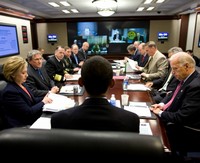Having won re-election, President Barack Obama now faces the daunting task of reinvigorating American foreign policy. There are reasons to be optimistic. As he turns his sights to his second term, the president has the benefit of four years of executive experience and is buoyed by the political capital that comes of even the most modest electoral victories. Both could translate into a more determined hand at the helm of the ship of state, even if domestic challenges will necessarily receive the lion’s share of the president’s attention. But for the Obama administration to solidify what has to date been an uneven record, a number of shifts are necessary.
To begin with, as the foreign policy and national security posts for the second-term administration are filled, the guiding imperative must be on streamlining and harmonizing a team that has often been operating at cross-purposes. It is probably too much to expect that the administration will implement the structural reforms to the U.S. national security institutional architecture that have been called for, mantra-like, since Sept. 11. Nonetheless, the executive branch has already adopted, in theory, an interagency and whole-of-government approach to global challenges. In practice, the success of that approach still depends on individual personalities working together. That has not been the case during Obama’s first term. The team of rivals approach to national security appointments should now give way to building a complementary and smoothly functioning team of partners.
The second urgent issue that must be addressed is the lack of a consistent and coherent approach to military interventions in humanitarian crises in which the U.S. either does not have a strategic interest at stake, or where there is clearly no cost-effective way to ensure a strategically desirable outcome. This is in part a Sisyphean task for a country like America, whose self-image includes a global responsibility for defending a universalist vision, and whose military alone has the capabilities to actually fulfill that responsibility. The very nature of global affairs, too, at times requires improvised and ad hoc responses to unforeseeable crises and intractable problems. Solutions are a rarity, which is why we more often speak of crisis management, rather than crisis resolution. But for the past two years, the Obama administration has been visibly handicapped by the conflict between its pragmatic and idealist instincts. The national debate over liberal interventionism will no doubt continue for many years to come. The debate within the administration must not. Obama must choose, setting the administration’s line, for better or worse, for the next four years.

